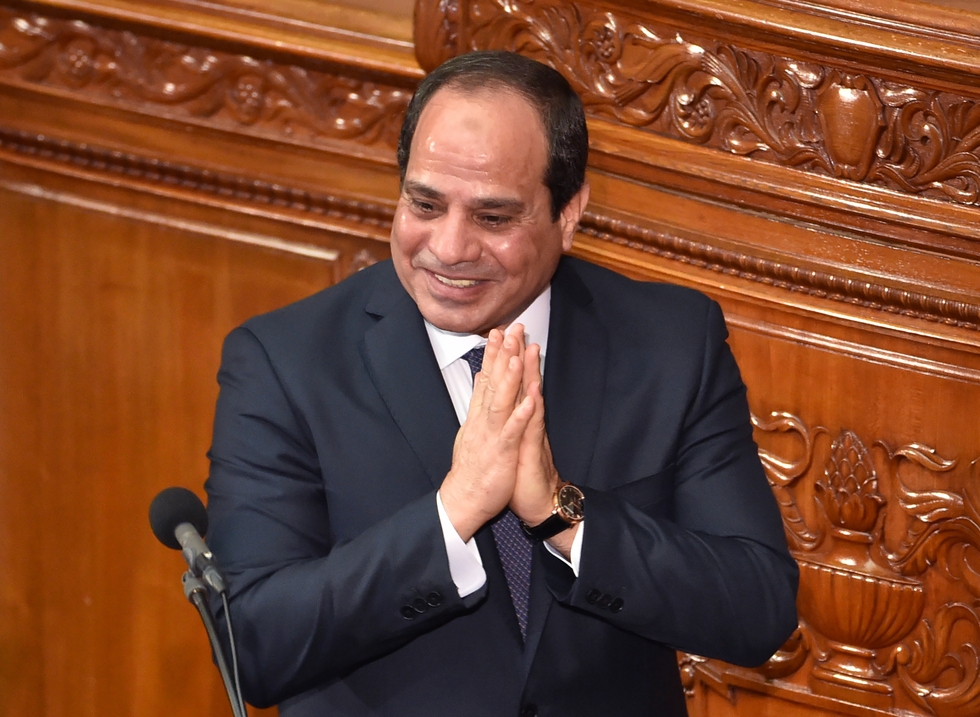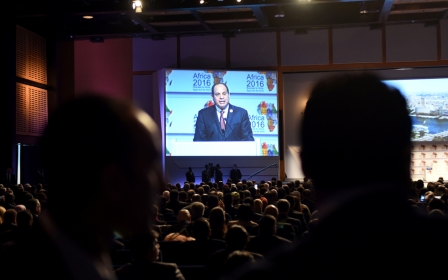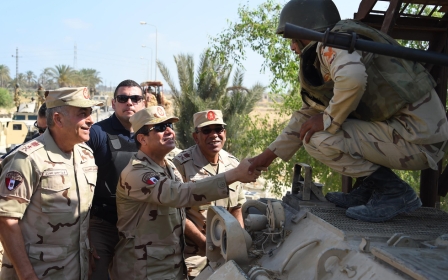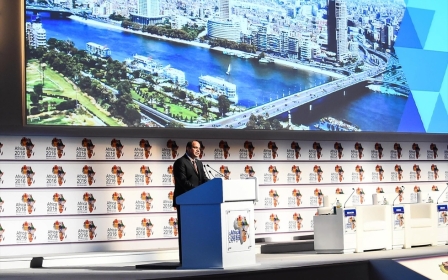Beyond satire: Sisi is saviour, smiter of enemies and arbiter of God's will, and don't you forget it

To the John Olivers of the world, Egypt’s President Abdel Fattah al-Sisi is a God-send: a treasure trove of infuriating, incoherent, often patronising one-liners; perfect material to get their shows trending on Google search.
Sisi's critics sarcastically focus on his apparent failure to articulate, his inexplicably long mid-sentence silences and incomplete phrases that make little sense in context.
But dig a little deeper and you’ll find that Egypt’s former military intelligence chief is perfectly on-message, public relations-wise. Following the rules of the game to the letter, he deflects focus from crisis situations, shows humility when necessary and affects a chameleon-like readiness to change his stance on even the most contentious issues. When faced with uncomfortable facts, he answers with a bridging phrase ("let me tell you something" or "the truth is" - as if only he owns it). He then quickly moves on to communicate his key messages, which he hammers in at every opportunity, regardless of how appropriate they are in that particular instant. And when he’s stuck, he always falls back on God.
For many among the masses of Egyptians who are the target of Sisi’s public communications, the president can say no wrong.
To sustain this image, he delivers four basic messages ad nauseum every time he speaks: First, that Egypt is collapsing as a result of 50 years of failed governance and that the current situation is worse than anyone can imagine. Second, that Sisi is a divine gift, the “saviour-with-a-strategy,” the voice of reason and justice, the father of the nation, a man with a big heart, a transparent and honest soul who works tirelessly to improve the lives of the poor and the dispossessed, and is the only one who can guarantee stability and prosperity by reinforcing the authority of the state and fighting terrorists, even if this entails stomping over civil liberties and human rights. Third, that as Egyptians we are all responsible for the country’s failure (implicitly shielding his administration from accountability) and must all therefore pay for it somehow. Fourth, that we must all work hard for and look forward to a brighter future (by implication, not for us but for our grandchildren).
Whether adopting the new-fangled approach of on-air phone-ins or addressing the nation in an official speech, Sisi makes variations on the above themes.
Take his first ever phone-in, to Amr Adib’s Al Qahera Al Youm on the fourth anniversary of Egypt’s most fatal football violence. Context: thousands of Ultras Ahlawy, diehard fans of Ahly football club, call for the execution of a former military leader and insult the police at a ceremony remembering the 74 who were killed on that fateful day, a crime for which no one was held accountable.
In the 20-minute conversation, Sisi used superlatives on eight separate instances to emphasise the complex crisis Egypt is facing, leading to its pending collapse: “the country is in ruins”; he’s dealing with the “remains of a state” suffering “the ramifications of 50 years of disintegration” which has left it “mutilated”; the “challenges are beyond the imagination,” with “every nook and cranny” infested with corruption, negligence and inefficiency beyond any human ability to fix it.
In true populist fashion, he used watered-down language to imply that Egypt is approaching apocalypse in a recent 90-minute official address outlining his administration’s “sustainable strategy” until 2030. Working up to the conclusion that “what was achieved in the past year and half would have taken 20 years achieve,” he dropped enough hints about the country’s imminent collapse to exaggerate his false achievements, focusing mostly on his own qualities as a leader.
After introducing himself as one who speaks with “honesty, loyalty, integrity and knowledge,” Sisi dedicated the first five to seven minutes of the speech to stress that the country is susceptible to “real threats,” using language that resonates with “all Egyptians … not just the intellectuals and thinkers among” them, many of whom have been made to believe through a 1950s'-style media machine that an international conspiracy against Egypt is behind all the country’s troubles.
From there he sprung into a listicle of construction projects that were finished “against all odds,” all the while emphasising that no one knows Egypt like he does, before abruptly switching to attack mode, complete with wagging index finger to deliver his classic: “I’m dead serious, don’t you listen to anyone but me!”
At some point, he even urged attendees to take notes “so they can know the story of their country”.
And he continued: “Are we going to tear this country apart, or what? I won’t allow it! Beware! Beware! I won’t allow it. Don’t think that my patience and good manners means that this country will fall. I swear by Allah, if anyone approaches [Egypt] I will wipe him off the face of the earth.”
As he did in the Adib phone-in, where he mentioned Allah at least seven times, whether to swear by him that he holds no grudges against his detractors or to invoke His support, in his 2030 speech Sisi took the appeal to religious sentiments to a whole new level. In a four-minute tirade, he directly warned the media against criticising his administration’s handling of the stand-off with Ethiopia over its Renaissance Dam project.
“Just come to me and I’ll tell you what this whole story is about,” he said.“Mark your words because Allah will hold you accountable for them.”
Not only is Sisi the one to inform, vet, clarify, teach, educate and lead, he is also the arbiter of God’s wrath on the day of judgement, a larger-than-life figure who has knowledge of heaven and earth who can help erase your sins if only you would listen to him, and him alone.
As he oscillated between macro and micro issues, every five to seven minutes Sisi returned to the notion that “we must protect the country” from the terrible threat posed by “those people out there” who are casting doubt on the Egyptian state’s ability to “make its dreams come true,” those who work tirelessly to “deflate public morale”.
The implication is that we must be doubly vigilant about the internal enemy, that fifth column who disguise themselves as human-rights advocates or independent journalists and broadcasters. The gist of his talk about the media is that it is this meddling nuisance that puts unnecessary strain on the self-sacrificing, self-effacing paragons of efficiency (Cabinet ministers) who are “getting nothing in return for putting up with this”.
Invariably, Sisi wraps up his speeches with references to the military’s valiant fight against violent extremism and terrorism, which he uses as an opportunity to propagate the myth that “they [The Muslim Brotherhood] started it,” but, he always adds, “fear not,” their efforts to “destroy our very existence” will never bear fruit as long as we “stay united” because Egypt is in “good hands”.
Sisi’s Fascist Mussolini-style rhetoric, lionising himself, reinforcing the institutions to which he is beholden, and infantilising the Egyptian people has succeeded so far, but not without a price. Alternative media have lashed back mercilessly, every now and then blowing the sanctity of the president to smithereens.
However, it’s not every day that a “slightly used field marshal” is put up for sale on eBay.
- Rania Al Malky is a Cairo-based columnist and former editor of Daily News Egypt (2006-2012).
The views expressed in this article belong to the author and do not necessarily reflect the editorial policy of Middle East Eye.
Photo: Egypt's President Abdel Fattah al-Sisi at Japan's House of Representatives of the Diet, in Tokyo on 29 February, 2016 (AFP).
New MEE newsletter: Jerusalem Dispatch
Sign up to get the latest insights and analysis on Israel-Palestine, alongside Turkey Unpacked and other MEE newsletters
Middle East Eye delivers independent and unrivalled coverage and analysis of the Middle East, North Africa and beyond. To learn more about republishing this content and the associated fees, please fill out this form. More about MEE can be found here.





